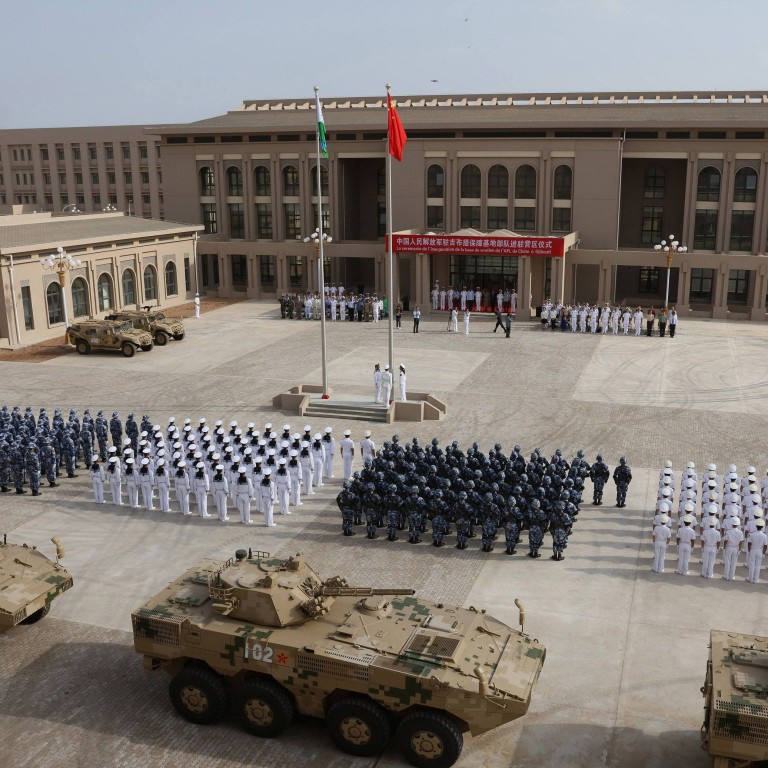
Do China’s Africa ambitions include a second military base?
- Washington unconvinced by Beijing’s denials of plans to expand its presence on the continent, but the move would align with global power aspirations
- Equatorial Guinea and Namibia are believed to be the most likely locations for any new base, as they would give the PLA a foothold in the Atlantic
The US remains unconvinced by Beijing’s continued denials of reports it may build a base on either the Atlantic or Indian Ocean coasts of Africa, and observers point out there were similar rebuttals over its first overseas base in Djibouti – until work started in 2016.
Washington has warned a new PLA naval base on either side of the continent “would threaten US national security”, with particular concerns over potential locations in Equatorial Guinea and Namibia.
Chinese state-owned shipping firms have already built, financed or are operating major ports on Africa’s Atlantic coast, including in Angola, Nigeria, Namibia and Equatorial Guinea.
On the eastern side of the continent, four Indian Ocean ports would be capable of berthing major Chinese military vessels, according to Paul Nantulya, a research associate at the Africa Centre for Strategic Studies at Washington’s National Defence University.
These are Mombasa in Kenya, the Tanzanian port city of Dar es Salaam, and Victoria in Seychelles, in addition to the Djibouti base at Doraleh, near the entrance to the Red Sea.
Nantulya said China had 2,000 troops permanently stationed at the Djibouti base and “has completed a pier that can accommodate an aircraft carrier, allowing China to project power beyond the Western Pacific”.
China aims to transform its military into a global force, capable of defending its interests around the world by 2030, with the further ambition of moulding its People’s Liberation Army into a “world-class military” by 2049.
According to Nantulya, Chinese military writings suggest “none of these can be achieved without improving China’s power projection capabilities and this includes establishing ‘maritime strategic strong points’ – namely military logistic facilities, or bases in simple terms”.
Nantulya said China had more than 10,000 firms in Africa, with about 2,000 to 3,000 state-owned enterprises among them. With growing Chinese investments and military-to-military cooperation agreements, Beijing could establish more bases on the continent in the next seven to 15 years, he said.
However, senior research fellow Zhou Yuyuan, with the Centre for West Asian and African Studies at the Shanghai Institutes for International Studies, said that from his communications with some officials “it seems China has no new plans to build a military base”.
How Chinese loans help fuel African military spending
Zhou said that, while the topic was a hot discussion in the US, there was little talk in China on the issue, and there appeared to be no interest in establishing another military base.
“America’s concern on this, in my opinion, is mainly driven by its domestic considerations, or by demand from different stakeholders,” he said.
“The military, specifically the US Africa Command, may expect to get [bigger] budgets or win more support from Congress and the White House because up to now, there is no detailed evidence on this but speculation.”
According to Zhou, China’s military base in Djibouti – which he terms a peace facility – “is mainly driven by commercial and human security demands, specifically providing support for navigation in the Gulf of Aden, and evacuations and people protection in case of a possible deteriorated situation in the neighbouring countries”.
“I don’t think there exist imperatives which can lead China to build a new military base in other regions,” he said.
How tiny Djibouti became the linchpin in China’s belt and road plan
Nevertheless, the United States remains concerned about the possibility. In March, the head of US Africa Command General Stephen Townsend said: “The thing I think I’m most worried about is this military base on the Atlantic coast, and where they have the most traction for that today is in Equatorial Guinea.”
Benjamin Barton, an assistant professor at the University of Nottingham’s Malaysia campus, said the prospect of another Chinese base raised alarm in some policy communities, mostly in the US and India, as well as some other Western countries.
“This is regardless of how the Chinese leadership tries to justify the rationale behind the need for a new base because it is seen as bringing into disrepute the current world order,” he said.
According to Barton, China is seen to be taking on the US at its own game of building bases around the world, including in countries where an American base might not be welcome.
But the apprehension was somewhat exaggerated, considering the US had more than 800 bases worldwide while China only had one, he said.
He added that the way the debate was often presented gave the impression of a degree of powerlessness – that the US, despite its global pre-eminence, could not stop states from entertaining the idea of a Chinese base.
“In the case of Djibouti, let’s not forget that the US was successful in lobbying Djiboutian President Ismail Omar Guelleh into preventing the establishment of a Russian base,” Barton said.
“However, in 2015, the US was caught flat-footed at the news that an agreement had been reached with the PLA Navy for China to set up its base. Even former secretary of state John Kerry was unable to stop this process despite making a visit in person to Guelleh at the time.”
A base in Equatorial Guinea would get China close to US – but will it happen?
In the case of Equatorial Guinea and of the prospect of a base at Walvis Bay in Namibia, Barton said there was also the fear of a Chinese presence in the Atlantic Ocean – something that had been unthinkable historically and would perhaps exacerbate a degree of strategic vulnerability.
When it came to establishing its next military base, China was likely to opt to work with potential partners already highly placed in its system of strategic diplomatic rankings, he said.
Nantulya said China employed a “blended security approach” and a “distributive strategy” where heightened military engagements went together with heavy financial, commercial, and economic equities and other considerations like maritime location, proximity to key Chinese sea lanes of communication, and relevance to China’s broader maritime strategy.
John Calabrese, head of the Middle East-Asia Project at American University, said another Chinese base in Africa “could validate the suspicion or claim that Beijing, despite denials to the contrary, is following a grand strategy of using its economic resources to leverage to lay the groundwork for establishing a hierarchical world order ultimately dominated by China”.
He added that any new Chinese base “could eventually serve as a platform for challenging the US in the Atlantic Basin, just as the US and its allies are exerting pressure in the Western Pacific”.
Calabrese said Chinese officials simply could be adopting the “standard practice” of emerging global powers with far-flung and growing economic interests – namely, building platforms from which to protect their nationals, assets, and other equities.
Lina Benabdallah, a specialist in China-Africa relations at Wake Forest University in North Carolina, said US concerns about another Chinese military base in Africa were because China’s engagement in Africa was viewed through a zero-sum lens with regards to US national interests.
“This is the reason an expansion of China’s influence in the continent is taken as a challenge to US power,” she said.



